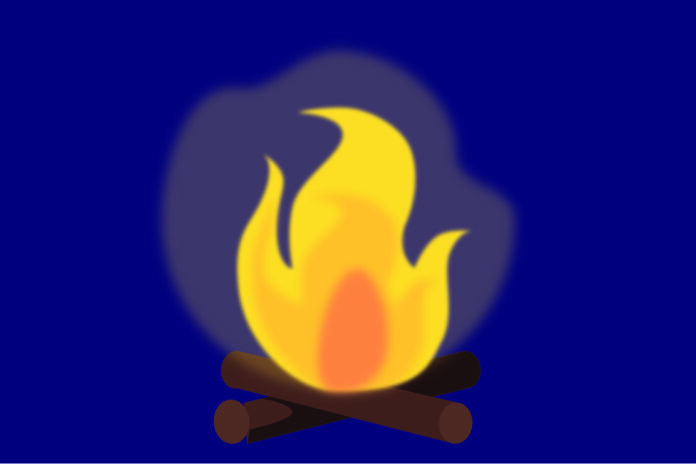How campfires and lazy conversation will save our lives
Campfire stories are a strange genre, living in old memories of childhood summer nights. Maybe some people get the opportunity to sit around a fire and tell tall tales with friends a couple times a year, but very few people I know regularly tell campfire stories or have campfires at all.
It’s a bit of a cliché to call modern American life “fast-paced,” but we do live in a world that increasingly runs 24/7, and there’s something to be said for rituals that acknowledge natural cycles and force us to slow down. Campfires do this extraordinarily well. Something about flames is mesmerizing, and when you add cold temperatures, a fire draws people together with irresistible force, creating — for a moment — a circle of people with nowhere else to be.
It’s strange how rare that is in my life, that collective slow-down. Every other ritual that comes to mind for bringing people together — eating, drinking, exercising — offers some sort of distraction from just sitting and talking. But a fire demands either a conversation or a shared quiet, and both are surprisingly powerful.
I’ve been at rowdy campfires with whiskey and guitars; at existential, stargazing campfires; at quiet, tired, relaxing-into-sleep campfires. Sometimes they’re with people I’ve known since I was a little kid, sometimes with people I’d met earlier that day. But I always come away from them feeling a little less alone in the world.
There’s a very particular kind of loneliness that a lot of people go through in college. There are so many reasons for it: moving away from family for the first time, diving into heavier workloads, reorganizing, readjusting, relearning. And honestly, it’s not just college students: Americans are incredibly lonely these days.
I was talking to a landscape manager at the dorms a while back, and he said something that surprised me: The dorms are much quieter now than they were more than a decade ago, when he started working at UC Davis. He put it down to less shouting and rock-throwing to get people’s attention, and that makes sense — texting is the new norm. And there’s just less incentive to loiter in communal space. Might as well just hang out in your room.
I’ve been told to “disconnect,” and while it often feels like it’s coming from a place of patronizing hypocrisy, taking a break from screens and the daily grind is absolutely important for everyone’s sanity.
But it’s not just about going for a run or reading a book for a little bit; it’s just as important to do nothing with other people, to take the time to sit around and have conversations with lulls, to be organic.
Camping means bumping into people and making quick friendships. A shared campfire turns awkward pauses into comfortable lulls and bad jokes into banter, breaking down the awkwardness and normal boundaries that separate strangers. Outside, comfort and familiarity. Inside, the coziness and calm of a fire. And who wouldn’t want that?
The kind of gathering campfires elicit is a dying breed. But making room to share ridiculous stories, tell jokes, talk about the day or sit quietly is as essential to our lives now as it’s ever been, and losing the gathering points where we can comfortably share laziness is incredibly isolating.
As our relationship to technology keeps developing and changing, I hope people keep thinking about not only how to personally challenge encroaching technology but how to carve out places where we can escape virtual connection without being alone.
Written by: Anna Kristina Moseidjord — akmoseid@ucdavis.edu
Disclaimer: The views and opinions expressed by individual columnists belong to the columnists alone and do not necessarily indicate the views and opinions held by The California Aggie.









